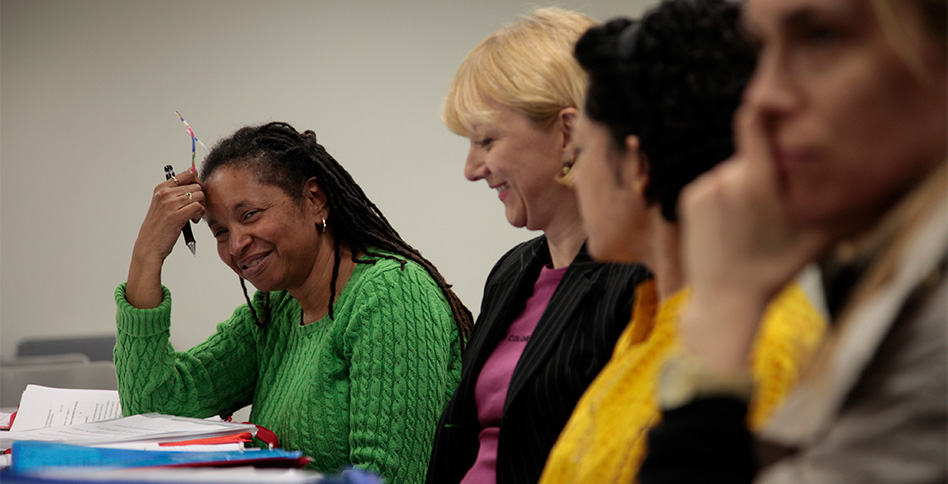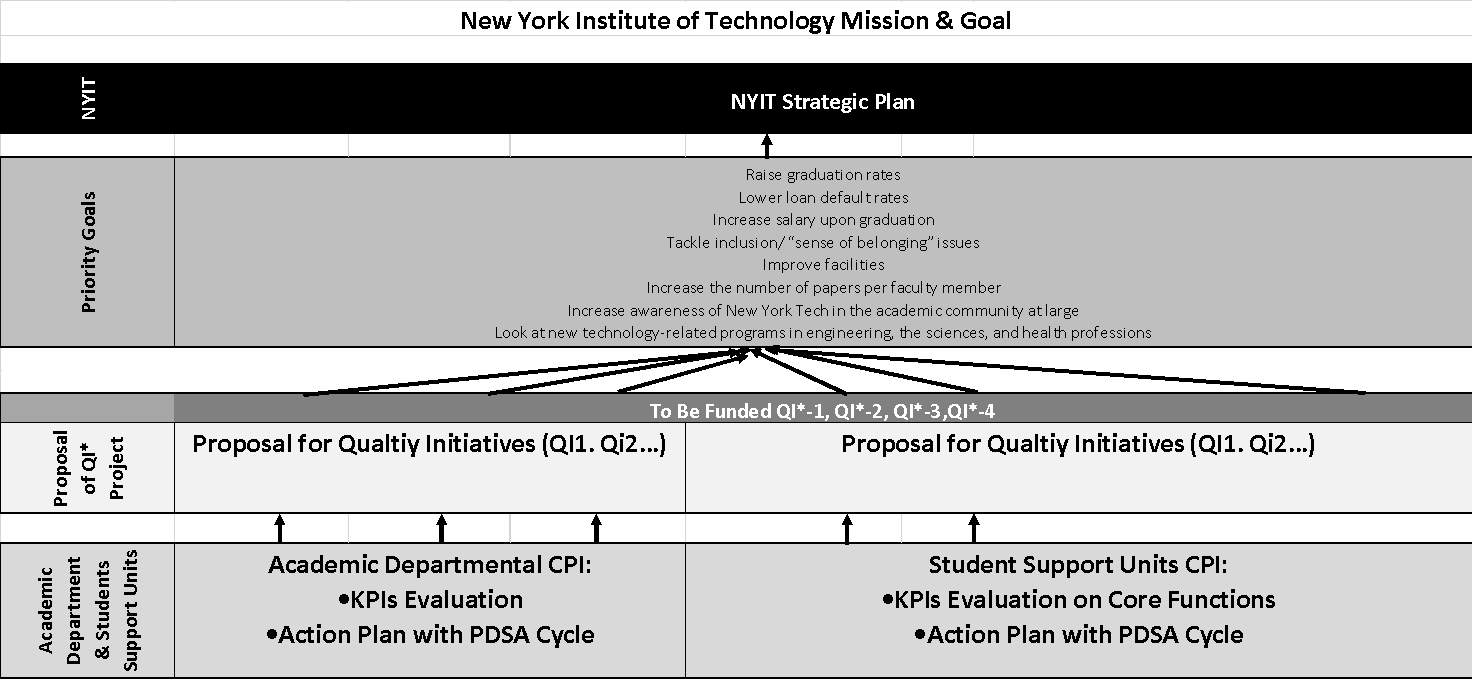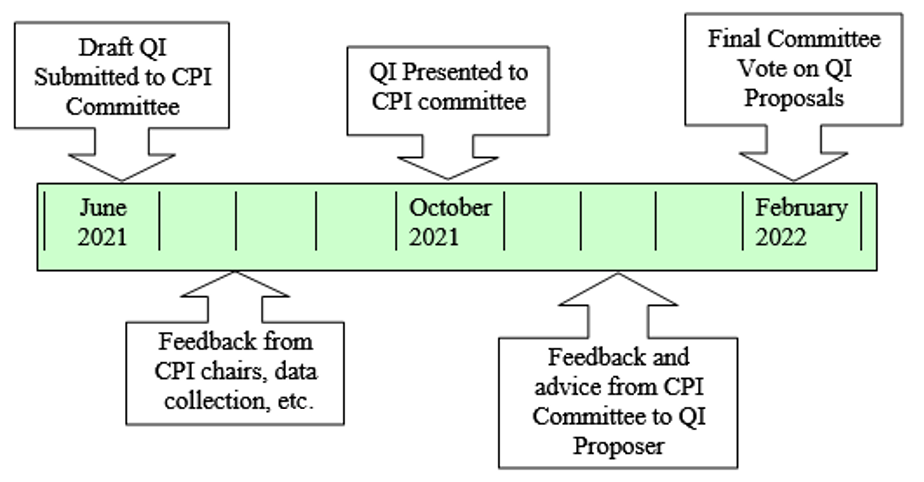
Continuous Program Improvement (CPI)
New York Tech implemented Continuous Program Improvement (CPI) in 2020 across all academic department and students support units to improve educational effectiveness. CPI emphasizes a data-informed, decision-making process to guide departments for overall quality improvement that leads to the improvement of students' learning, college experiences, and achievement.
CPI Administrative Structure – Academic Senate Committee
CPI Committee Charge
The CPI Committee of the Academic Senate is the institutional unit that brings together all assessment and improvement activities at the university—for programs with or without professional accreditation, and for academic departments and student support units. The committee members come from all academic schools and numerous support departments.
The committee's mission is to:
- Raise the visibility of CPI for educational effectiveness assessment within the university
- Maintain a common, unified, mission-driven process
- Improve educational effectiveness by increasing faculty participation in and knowledge of science of improvement
- Prepare a formal annual report on the status of assessment at the university, including recommendations for improvement
- Ensure that the Continuous Program Improvement (CPI) process is used to advance New York Tech's mission and goals and connected with financial planning and support
- The CPI process and policies are meeting Educational Effectiveness Assessment (MSCHE, Standard V)
- Periodically evaluate (CPI) process and make recommendations for improvements
Deming's Model for Continuous Improvement
CPI Framework and Process
The Framework: CPI annual process is for all academic department and students support units. It is designed to align departmental assessment and continuous improvement efforts with the university's mission and goals to improve student learning and achievement.

Process and Policy:
- Academic departments and student support units cascade institutional goals to their level appropriate goals according to their program's mission and functions.
- Select appropriate key performance indicators (KPIs) for each of the goals that can accurately measure the performance, motivate and direct actions, and identify opportunities for improvement.
- Apply W. Edwards Deming's improvement model (see above) to develop, test, and implement changes for improvement.
- Hold an annual departmental review and planning meeting, and focus departmental energy and effort on a couple of Key Performance areas each year to make the CPI a sustained and manageable process. The major KPI areas include:
- Student learning outcomes (curriculum, course and program level learning outcomes update)
- Student success (admission criteria review, retention, DFW, graduation rate, license passing rate…)
- Student engagement and satisfaction (NL_SSI, NSSE, or departmental survey)
- Faculty performance (teaching evaluation, scholarship, services)
- Cost efficiency (classroom utilization, equipment and technology sufficiency...)
- Departmental policies and procedures (review and update)
- Self-defined others
- The institution rewards improvement with recognition and resources for quality initiatives (QI).
QI Financially Supported CPI Projects
What is the QI-CPI?
QI is a financially supported, continuous program improvement project.
- An academic or administrative department determines that their CPI improvement initiative requires additional funding from the institution and submit a QI proposal (docx).
- Approval of QIs is subject to guidance and a vote by the CPI Committee, based on QI evaluation criteria (pdf).
- The vote will determine whether the QI is recommended by the CPI Committee for funding.
- Current criteria are largely based on the "Priority goals" as stated in New York Tech's most recent SIR submitted to MSCHE in late 2020 and accepted in early 2021.
What is the timeline for submission, review, and voting results?

QI Proposals and CPI Committee Voting Results
| 2019–2020 QI Proposal |
2019–2020 Committee Review and Voting Results |
2020–2021 QI Proposal |
2020–2021 Committee Review and Voting Results |
2021–2022 QI Proposal |
2021–2022 Committee Review and Voting Results |
CPI Plan Templates
- Improving Student Learning (PLO) Plan Template: WORD | PDF (view)
- Improving Student Success Plan Template: WORD | PDF (view)
- Improving Student Success Plan Template – Student Support Units: WORD | PDF (view)
CPI Plan Implementation Report Templates
- Improving Student Learning (PLO) Report Template: WORD | PDF (view)
- Improving Student Success Report Template: WORD | PDF (view)
- Improving Student Success Report Template – Student Support Units: WORD | PDF (view)
Annual Report and Quality Initiative Templates
- Academic Department Annual CPI Report Template: WORD | PDF (view)
- Department KPI Selection: WORD | PDF (view)
- Student Support Unit Annual CPI Report Template: WORD | PDF (view)
- Quality Initiative Proposal Template: WORD | PDF (view)
- Quality Initiative Proposal Reviewer Form: WORD | PDF (view)
- Quality Initiative Report: WORD | PDF (view)
Research and Resource Guides to CPI Development
- Best Practice in Career Services Measurement
- Best Practice in Experimental Education Measurement
- EAB Academic Vital Signs (Aligning Departmental Evaluation with Institutional Priorities)
- EAB Barriers to Student Success
- The Six Core Principles of Improvement (Carnegie Foundation for the Advancement of Teaching)
CPI Annual Reports
CPI Committee Meeting Schedule and Minutes
CPI Committee meetings are open and will be held on the following dates and times during the 2023–2024 academic year:
- Thursday, October 5, 2023, 12:45–2:10 p.m.
- Thursday, November 30, 2023, 12:45–2:10 p.m.
- Thursday, February 22, 2024, 12:30–1:50 p.m.
- Thursday, April 18, 2024, 12:30–1:50 p.m.
A list of committee members, meeting Zoom links, and meeting minutes can be found here.
CPI Day